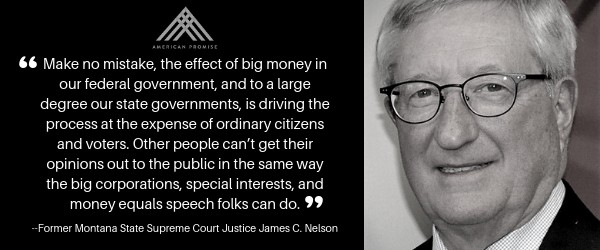Montana Supreme Court Justice James C. Nelson served Montana from 1993 until his retirement in 2012. In this Q&A, Justice Nelson shares his opinions about the Citizens United Supreme Court decision and its impact on the political landscape, especially the judicial branch. The recently aired PBS documentary Dark Money highlights the effects of political contributions on Montana politics, and further elucidates the effects of big money Justice Nelson describes.
How would you describe the links between big money in politics and the partisanship we see surrounding today’s Supreme Court nominations?
The Citizens United decision handed down in January of 2010 opened the floodgates for big money to come into the political process, not only for elected executive and legislative branches of the state and federal government, but also for the elected and appointed judiciary of the third branch of government, the judicial branch.
The influx of money has changed the political landscape of our government in important ways. The power and speech money can buy is driving the executive and legislative branches of government. And as we’re seeing now, big money is driving appointments in the federal judiciary system, as well. For example when Justice Gorsuch was appointed and approved to the Court, one individual provided more than $25 million to facilitate that appointment. We’re seeing that in the present nomination of Judge Kavanaugh, as well. In my state, Montana, we see TV ads supporting his nomination saying what a great guy and wonderful judge he is. Make no mistake, the effect of big money in our federal government, and to a large degree our state governments, is driving the process at the expense of ordinary citizens and voters. Other people can’t get their opinions out to the public in the same way the big corporations, special interests, and money equals speech folks can do.
How does big money in politics break down the checks and balances among the branches of government?
We’re seeing this now in the federal government. The Constitution is designed for each branch of government to check and balance the other. The branches of government are meant to be equal to each other, each with separate duties and responsibilities. When they’re exercised independently, the system of checks and balances works.
Right now in the federal government the system of checks and balances has broken down completely, at least with the executive and legislative branches. Congress is afraid to stand up to the president, so the president gets what he wants from Congress. Congress is not checking the executive branch as it should. Now we’re going to see, assuming Judge Kavanaugh is confirmed, the third branch getting in on the same pot, losing its ability to check and balance the other branches of government. With Kavanaugh, there will be a very solid, very conservative majority on the Court, and that Court is going to make sure the Republican agenda survives any challenges.
Judge Kavanaugh has an expansive view of executive power. He believes, we learn from some of his writings, the president can ignore laws passed by Congress. If we have a situation where we have no checks and balances and an executive in charge of the other two branches, that’s a fascist state. It’s extremely important that the system of checks and balances stays in effect. It’s being broken down today with the ability of non-human legal entities—SuperPACs, special interests, and the wealth of certain individuals—to influence elections, policy and buy their way into government.
How does big money in politics lead to a breakdown of impartiality among judges?
Federal judges are not elected, but appointed. But that doesn’t mean big money doesn’t influence these appointments. The mega-money people have the ability to influence the decision-makers—they influence the president on who’s appointed, and influence congresspeople and senators on who is confirmed to the federal bench.
On the other side of the coin, 38 of our 50 states elect trial and appellate judges. Montana, for example, elects all trial judges. Empirical and academic studies show how big money influences the election of judges. One study, sponsored by the American Constitution Society in 2013, Justice at Risk: An Empirical Analysis of Campaign Contributions and Judicial Decisions, authored by Emory University law professor Joanna Shepherd, showed that business groups overwhelmingly dominate spending in television advertising for state judicial races. This study looked at elections to the appellate court in all of the states. It showed that, when business groups spend money to secure their appellate judge elections, those judges have a tendency to vote in favor of business.
A second study, also by Professor Shepherd and Michael S. Kang, Skewed Justice: Citizens United, Television Advertising and State Supreme Court Justices’ Decisions in Criminal Cases, showed that financial expenditures are seldom to promote judges. They’re usually targeting opponent judges with negative ads. These ads—often intended to show judges as “soft on crime”—actually affect the rulings judges make on defendants’ cases. The study showed the more TV ads aired during a state judicial race, the less likely justices are to vote in favor of criminal defendants.
Then there is the third study. In 2017, the Brennan Center for Justice at NYU School of Law released a study called Who Pays for Judicial Races? The Politics of Judicial Elections 2015-2016. That study showed, among other things, that outside spending in the 2015-2016 election cycle shattered all records, with outside spending making up $27.8 million, an unprecedented amount of money in Supreme Court election spending. The 2015-16 cycle saw an influx of dark money—in fact, only 18 percent of the donors could be traced. That means we don’t know who is sponsoring ads, who is making these donations or why.
I can use my state of Montana as an example. Before Citizens United, most of the money raised for judicial campaigns was raised by candidates themselves. That now ceases to exist. The amount of money candidates raise themselves post-Citizens United is substantially less than the money expended by mega-money spenders. Now more and more judicial elections come in at over $1 million. We never had a $1 million race in Montana until 2012; we’ve had three elections since—every one over $1 million. That’s the effect of money on judicial elections. These million-dollar races are the new norm. Candidates cannot raise that money. The candidates are becoming—indirectly, if nothing else—dependent upon big money to finance their races, to finance TV ads for the candidate or against their opponent. And these negative campaign ads are more often than not misleading.
We had a case in Montana a couple of years ago. A judicial candidate was a district trial judge. He’d sentenced a child molester to a fairly light sentence. His opponents ran misleading ads characterizing him as soft on child molestation. But the attorneys had negotiated the sentence because the prosecution had a weak case and probably would have lost at trial. So the attorneys negotiated a light sentence to prevent the accused from getting no punishment, and the judge agreed. That’s how big money, dark mega-money is influencing judicial elections: with TV advertisements, slick mailers, and negative advertising that misrepresents the candidate’s record and misinforms the public.
How could a Constitutional amendment fix these problems?
The amendment would fix not only the judicial branch but what’s going on in the other two branches, as well. It’s a global fix for Citizens United.
Citizens United was the culmination of a 200-year struggle of the Court trying to determine what the Constitutional rights of corporations are or should be. In the Citizens United case, the Court, relying on precedent from cases such as First National Bank of Boston v. Bellotti and Buckley v. Valeo, held that the First Amendment protects free speech of corporations—that corporations are associations of citizens, and that those citizens have the right to free speech and other citizens have the Constitutional right to hear what those citizens have to say. Citizens United held that those citizens could not be deprived of their ability to spend the association’s funds to get their message out, and that these associations can spend money for and against a candidate.
The Court did uphold the ability to prohibit expenditures directly to a candidate, quid pro quo corruption. But the court said indirect expenditures for and against a candidate don’t breed corruption. In a non-linear universe that may be true, but it’s not true in our present society. Candidates obviously know who is expending money for and against them, just as they would know who is contributing to their campaigns. And these expenditures do have an effect on the judicial process.
One thing the Court said, which is troubling, is that speech can be bought, that money equals speech. That means the more money one has, the more speech one can buy, therefore the more influence that person’s particular speech has in the marketplace of ideas. If a Super PAC spends $5 million to defeat Judge A, it can buy all sorts of negative ads to defeat the candidate. Now, if you want to give some money to the campaign of Judge A, you can do that. If you want to write a letter to the editor about Judge A being a great judge, you can do that, too. But in the marketplace of ideas, your point is diluted to the point of almost nothingness compared with that huge negative ad campaign financed by that Super PAC. Citizens United results in a speech equals money scenario that dilutes the voice of the ordinary citizen and dilutes the vote. And the empirical studies show this money buys votes. So if my slick $5 million ad campaign can change the minds of 6,000 voters, I’ve bought 6,000 votes in that election. If you’re an ordinary voter, your vote doesn’t count much compared with the 6,000 votes bought for the other side.
The 28th Amendment—proposed by American Promise and supported by thousands of citizens, municipalities and states—would redefine what constitutes Constitutionally protected speech. The amendment would undo the effects of Citizens United. It would restore certain Constitutional rights for humans only. It would allow Congress and the states to regulate campaign finance as they did before Citizens United. Before Citizens United, Montana had an act that limited the amount of money in elections, and had regulations on business donations to elections. Much of that went out the window when Citizens United was handed down, and a lot of states were in that same pot—no longer able to control campaign finance as they need to and should.
The effects of dark money, especially in our state, are well-exemplified in the documentary Dark Money, which first aired on PBS this week. People interested in this subject should take a look at that documentary, and see how dark money affects not only the popular branches of government but also the judicial branch. Big money is a cancer, and it’s eating away our democratic processes. It’s eating away our democracy. It’s turning us from a republic into a fascist state or an oligarchy. Money comes from greed, and greed seeks power. Money corrupts and a lot of money corrupts absolutely.
Former Montana Supreme Court Justice James C. Nelson was appointed to the Court by Republican Governor Marc Racicot in 1993. Nelson earned his Bachelor of Science degree from the University of Idaho and his Juris Doctor degree from George Washington Law School. He served as president of the Glacier Chamber of Commerce, Chairman of the Montana Board of Oil and Gas Conservation, and a member of the Montana Governor’s Task Force on Corrections and Criminal Justice Policy. After several years as Glacier County’s top prosecutor, he was appointed to the State Supreme Court in 1993, where he served until his retirement in 2012.







